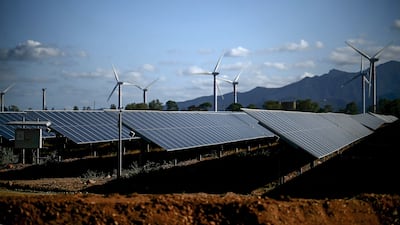International investment in renewable energy must triple to $1.5 trillion annually by 2030 to meet the global goal of tripling renewables, the International Renewable Energy Agency has said.
Despite record spending of $570 billion last year, current national plans are set to deliver only half of the required renewable power growth, the Abu Dhabi-based Irena said in a report released on Friday after the pre-Cop29 talks in Azerbaijan.
This huge funding gap threatens the global objectives of tripling the renewable capacity and doubling energy efficiency by 2030, which are critical for maintaining the 1.5°C threshold established in the Paris Agreement in 2015, a treaty in which 195 nations pledged to tackle climate change.
The world needs to "think bigger, act bolder ─ and collectively move faster on our energy transition journey”, Dr Sultan Al Jaber, Cop28 President, said.
“The opportunity is there but we need more nations to step up to the plate by including specific renewable energy and infrastructure targets in their upcoming NDCs [Nationally Determined Contributions], incentivising private investment, and making it easier to develop and deploy projects,” said Dr Al Jaber, who is also UAE Minister of Industry and Advanced Technology.
NDCs are climate action plans that individual countries develop and submit to outline their commitments to reduce greenhouse gas emissions and adapt to climate impacts.
Irena’s report followed Dr Al Jaber’s comments at Global Renewables Summit in New York City in September, where he emphasised global investment in renewable energy must more than triple in the next six years to meet the 11,000-terawatt capacity target by 2030 needed to keep 1.5°C within reach.
The UAE Cop28 presidency has a signed a partnership with the hosts of the next two climate conferences, Azerbaijan and Brazil, to help keep the crucial global climate goal within reach.
The Cop presidencies troika aims to boost co-operation and ensure continuity between the hosts of the annual climate talks in what is being called “mission 1.5ºC”.
To deliver the UAE consensus goals on the ground, “significant advances” will be required across the key sectors of energy transition, including infrastructure and system operation, policy and regulation, supply chains, skills and capacities, finance and international collaboration, the Irena report said.
To meet the global goals, installed renewable capacity needs to reach 11.2 terawatt by 2030 from the current levels of 3.9TW. However, the current national plans are projected to leave a global collective gap of 3.8TW by 2030, falling short of the goal by 34 per cent, the report revealed.
The annual energy intensity improvement rate must increase to 4 per cent on a yearly basis, as well by the end of the decade, from 2 per cent in 2022. This will require faster progress in efficiency measures and electrification across multiple sectors, including transport, building and industry.

“Today, we are raising the alarm, we must flag significant gaps. The next NDCs must mark a turning point and bring the world back on track,” Francesco La Camera, Irena’s director general, said.
Most of the recent growth in renewable energy has been driven by China, the EU and the US. Meanwhile, many developing countries have fallen behind in clean-energy investment because they lack adequate funding and infrastructure.
Accelerating renewable energy adoption would require overcoming certain “structural barriers”, Mr La Camera told The National in an interview in January.
Irena’s latest report indicated that emerging and developing economies continue to face “financing gaps that undermine access to capital-intensive energy transition technologies”. Renewable power investments in Africa declined by 47 per cent between 2022 and 2023. While Sub-Saharan Africa received 40 times less than the world average per capita transition-related investment.
“To take tangible steps and turn these recommendations into reality, we are working closely with international partners to ensure that commitments translate into tangible outcomes that benefit all nations, including those most vulnerable to the impacts of climate change,” Mukhtar Babayev, Cop29 president designate, said.
“The time for action is now. We call on all stakeholders – governments, businesses and civil society – to intensify their efforts and deliver progress in support of these critical goals."


